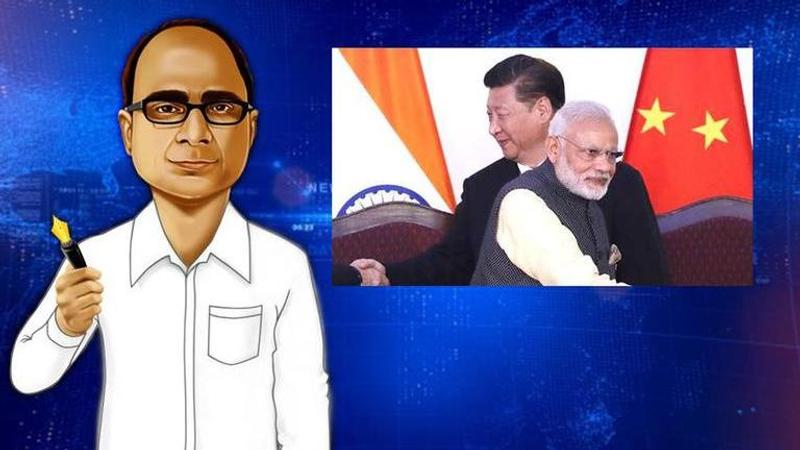Published 22:56 IST, July 5th 2020
In The Events of Last Two Months, A Challenge For The World To Unite Against China
Events of the last two months have made it an imperative for nations to think in terms of a joint military strategy against China.

At the turn of the century, there was a sci-fi Hollywood flick 'Independence Day' themed around the United States of America (USA) saving the planet from an alien attack as the rest of the world watched and cheered. The aliens were shown as some kind of a scavenger civilization that travelled like a swarm of locusts around the space gobbling up natural resources and destroying other races, before they meet their Waterloo in Area-51 of the United States. The swagger of the fictional American president reflected the afterglow of having defeated and dismantled Soviet Russia in the Cold War and fashioned much of global geopolitics as per Pentagon's drawing board.
It was also around the turn of the century that China became a member of the World Trade Organization (WTO) — like in the case of UNSC, egged on by India — and welcomed by the United States. Almost a quarter of a century later, there's a civilization flexing its muscles, gobbling up natural resources, bullying neighbours, and staking claim to rest of the century ahead, like the 20th belonged to Americans or the 19th to the British. Only that this is no Hollywood fantasy and the American swagger is missing. Incidentally, I write this amid July 4 celebrations in the United States.
The Communist regime's well thought through transgressions in both East and South China Seas pushing the 'Nine-Dash Line', despite an international court order against it, sinking of Vietnamese vessel, shoving Japan on Senkaku island, sledging the Australians, bringing in the HongKong law marking its final annexation, and killing 20 brave Indian soldiers in Ladakh - all have come within last two months. And the United States has only managed to send two aircraft carriers in the South China Sea, apart from some words of assurance to all allies. Suffering worst of the Coronavirus pandemic, marred by the 'Black Lives Matter' protests and consequent law and order situation, and facing an election season that brings out all the fissures in a democracy even in normal times, USA is in no position to hit back at China as the free world would have liked to.
Only that this was in the making for some time. The Chinese sense of its own destiny had become visible in the early part of the 2000s itself. On his first visit to the United States in 2006, the then Chinese premier Hu Jintao flew over the Pacific to land in the Silicon Valley, dashed down to Los Angeles to woo the Hollywood elite, came to New York to engage with the Wall Street bulls, and went to Washington D.C. for a bilateral with President George W. Bush only on the last day of his six-days American trip. In another piece I wrote how in the period that America has been struggling to finish a metro line from the Dulles international airport to downtown Washington DC, China has built 29,000-km of High-Speed Rail (HSR), accounting for two-thirds of global HSR networks.
Donald Trump acknowledged it — howsoever grudgingly — in his UNGA speech in September 2019, when he singled out China for his diatribe. Speaking from the podium Trump informed the world, how in the same period that China had been WTO member, America had lost 4.2 million manufacturing jobs, shut over 60,000 factories, ran a trade deficit of 15 trillion dollars - roughly equal to present-day China's GDP – all because the Chinese gamed the global order. "It was expected that China would liberalize and move toward private property and rule of law. Instead, it has embraced an economic model based on massive market barriers, heavy state subsidies, currency manipulation, product dumping, forced technology transfers, and theft of intellectual property and trade secrets," he harangued before asking the world to unite.
Speaking at Nimu in Ladakh Friday, Prime Minister Narendra Modi underscored India's resolve to stand its ground when he said: "Everyone believes that peace and friendship are important for the progress of the nation, the world, and humanity. But we also know that the weak can never bring peace. The weak cannot initiate peace. Bravery is the precondition for peace." In the same UNGA speech, Trump could not have been more direct when he said he has spent over USD 2.3 trillion on his military machine making it by far the most powerful military on earth, before adding, "hopefully we won't need to use it ever." If ever there was time for the world to unite and give a well-coordinated response to the Chinese delusions of its destiny as the middle kingdom, it is now. Just sending two aircraft carriers to the South China Sea would not suffice. India will fight its own battle, as the Prime Minister has made clear with his Ladakh dare, but events of last two months have made it an imperative for nations from Australia to Vietnam to Japan to of course the United States to think in terms of a joint military strategy against China.
Updated 23:02 IST, July 5th 2020



